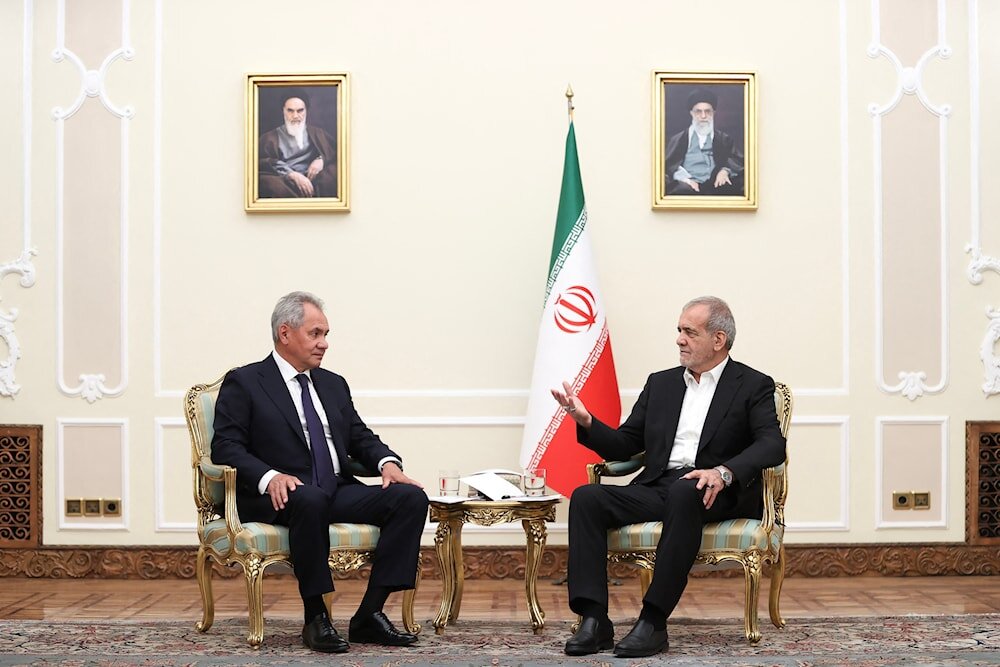Tehran, Moscow ties to flourish on 'permanent, stable, and enduring' path: Iranian president

TEHRAN – In a meeting held in Tehran on Tuesday, Iranian President Masoud Pezeshkian and Sergei Shoigu, Secretary of the Security Council of the Russian Federation, underscored their commitment to deepening bilateral relations between Iran and Russia.
In their discussion, the two sides highlighted a shared vision for cooperation as Iran and Russia both face sanctions imposed by Western countries.
Pezeshkian reflected on the historical ties between Iran and Russia, emphasizing that his newly formed administration is dedicated to advancing these relationships. "Our goal is to cultivate a partnership that not only withstands external challenges but also flourishes in a spirit of mutual respect and collaboration," he stated. Pezeshkian noted that enhanced cooperation would serve as a strategic buffer against the sanctions imposed on both countries.
“Ties between Tehran and Moscow will continue to advance on a permanent, stable, and enduring path,” the president said before mentioning the importance of taking advantage of frameworks like BRICS, the Shanghai Cooperation Organization, and the Eurasian Economic Union.
Shoigu, for his part, reiterated Russia's steadfast commitment to its partnership with Iran. He conveyed President Vladimir Putin's eagerness to meet with Pezeshkian at the Kazan summit, emphasizing that Russia's position on regional cooperation remains unchanged. "Our nations share common interests and challenges, and we are committed to working together to address them," he said.
‘Huge need for corridor expansion between Iran and Russia’
In another high-ranking meeting held in Moscow on Tuesday, the secretary of Iran’s National Security Council highlighted the importance of enhancing transportation projects and corridors between Iran and Russia while speaking to the Russian President's special representative.
During the discussions involving Ali Akbar Ahmadian and Igor Yevgenyevich Levitin, the special representative of the Russian President, the continuation of previously established agreements concerning military and commercial matters was also addressed.
Ahmadian stressed the need to expand the capacity of the existing corridors and optimize their utilization.
The Russian representative, in return, provided an update on the status of the corridor agreements to the Iranian security chief.
Ahmadian also expressed his approval of the advancements in transportation projects and corridors between the two nations, emphasizing the importance of increasing their capacity and maximizing their potential while reaffirming the Islamic Republic of Iran's full support for these initiatives.
In a subsequent meeting between Ahmadian and President Vladimir Putin, following the BRICS security discussions, the Russian President reiterated support for Iran's transportation routes.
The remarks come as the South Caucasus region has been locked in a tussle over the establishment of a transit route on Armenian soil to connect mainland Azerbaijan to the newly-annexed Nakhchivan enclave.
The proposed Zangezur corridor, envisioned by Azeri officials to connect Azerbaijan's two regions, has faced significant opposition from both Yerevan and Tehran. The corridor, which would traverse Armenian territory, is seen as a potential disruption of the historical borders between Iran and Armenia, sparking concerns from both nations. That’s because Azerbaijan has expressed its desire for the corridor to be under either Baku's or Russia's control, further fueling tensions.
Iran has warned multiple times that it will not tolerate geopolitical changes in the region, a sentiment that has been backed by its Russian ally.
Leave a Comment